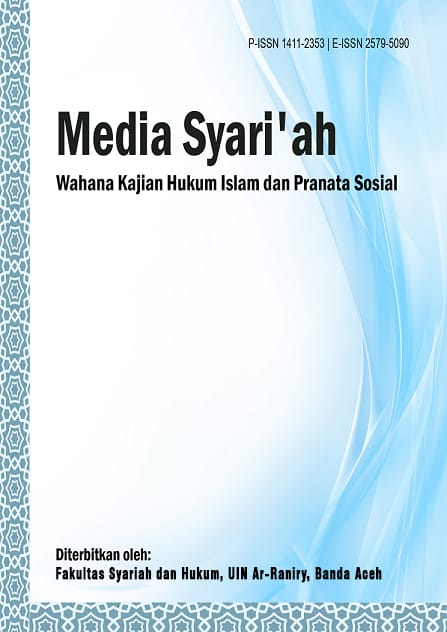Legalitas Hukum Islam dalam Sistem Peradilan Indonesia
DOI:
https://doi.org/10.22373/jms.v22i2.8050Keywords:
Legalitas, Hukum Islam, Sistem PeradilanAbstract
Abstract
This article will explain the legality of Islamic law in the justice system in Indonesia. The importance of this topic to be discussed is because judicial institutions in Indonesia are formed as a result of their multiple historical developments. It was said that because until now in the Unitary State of the Republic of Indonesia, several legal systems had various features, structures, and characteristics, namely; the Islamic legal system, customary law system, and Western legal system. The problem that he explains is related to the legality of Islamic law in the judicial system in Indonesia. To answer the questions above, this article uses a qualitative research method with a library research model as a data collection method. The search results found that there are several regulations that have been legalized so that they become positive laws in Indonesia, namely: 1) the 1945 Constitution; 2) Law Number 17 of 1999 concerning the Implementation of Hajj; 3) Law Number 36 of 1999 concerning Management of Zakat; 4) Law Number 41 of 2004 concerning Waqf; 5) Law Number 44 of 1999 concerning the Implementation of the Specialties of the Aceh Region; 6) Law No. 3 of 2006 concerning Amendments to Law No. 7 of 1989 concerning Religious Courts; 7) Law Number 1 of 1974 concerning Marriage.
Abstrak: Artikel ini menjelaskan tentang legalitas hukum Islam dalam sistem peradilan di Indonesia. Pentingnya topik ini untuk dibahas karena, lembaga peradilan di Indonesia terbentuk akibat dari perkembangan sejarahnya yang bersifat majemuk. Dikatakan demikian, karena sampai saat ini di Negara Kesatuan Republik Indonesia berlaku beberapa sistem hukum yang memiliki corak, susunan dan karakteristik yang beragam, yaitu; sistem hukum Islam, sistem hukum Adat, dan sistem hukum Barat. Permasalahan yang jelaskan berkaitan dengan legalitas hukum Islam dalam sistem peradilan di Indonesia. Untuk menjawab pertanyaan di atas, artikel ini menggunakan metode penelitian kualitatif dengan model library reseach sebagai metode pengumpulan data. Hasil penelusuran ditemukan bahwa ada beberapa aturan yang telah dilegalisir sehingga menjadi hukum positif di Indonesia, yaitu: 1) Undang-Undang Dasar tahun 1945; 2) Undang-Undang Nomor 17 tahun 1999 tentang Penyelenggaraan Ibadah Haji; 3) Undang-Undang Nomor 36 tahun 1999 tentang Pengelolaan Zakat; 4) Undang-Undang Nomor 41 Tahun 2004 tentang Wakaf; 5) Undang-Undang Nomor 44 tahun 1999 tentang Penyelenggaraan Keistimewaan Daerah Aceh; 6) Undang-Undang Nomor03 Tahun 2006 tentang Perubahan atas Undang-Undang Nomor 7 tahun 1989 tentang Peradilan Agama; 7) Undang-Undang Nomor 01 tahun 1974 tentang Perkawinan.
References
A. Hasjmy. (1995). Sejarah Kebudayaan Islam. Bulan Bintang.
A. Syalabi. (1997). Sejarah dan Kebudayaan Islam. al-Husna Zikra.
Al-Mawardiy. (1973). Al-Ahkam al-Sulthaniyyah. Musthafa al-Babiy al- Halabiy.
Amri, A. (2020). Perkawinan Beda Agama Menurut Hukum Positif dan Hukum Islam. Media Syari’ah. https://doi.org/10.22373/jms.v22i1.6719
Analiansyah. (2018). Hukum Pembuktian Dalam Islam: Penelusuran Pemikiran Jalaluddin at-Tarusani dalam Kitab Safinat al-Hukkam fi Takhlish al-Khassani. Sahifah.
Ash-Shiddiqiy, H. (1964). Peradilan dalam Islam. Bulan Bintang.
Ash-Shiddiqiy, H. (1993). Falsafah Hukum Islam. Bulan Bintang.
Bahi Abdul Mu’in. (n.d.). Tarikh al-Qadi fi al-Islam. t.pt.
Farida Prihantini, D. (2005). Hukum Islam Zakat dan Wakaf Teori dan Prakteknya di Indonesia. Papan Sinar Sinanti & FHUI.
Harahap, M. Y. (1999). Informasi Materi Kompilasi Hukum Islam: “Mempositifkan Abstraksi Hukum Islam”, dalam, Kompilasi Hukum Islam dan Peradilan Agama dalam Sistem Hukum Nasional. Logos.
Ibrahim Hasan. (n.d.). Tarikh Islam al-Siyasiy. t.pt.
Ichtijanto. (1991). Pengembangan Teori Berlakunya Hukum Islam di Indonesia”, dalam, Hukum Islam di Indonesia Perkembangan dan Pembentukan. Rosdakarya.
Madkur, S. (1964). Al-Qaẓa’ fi al-Islam. Dar al-Nahdhah al-Arabiyyah.
McKay, J. M., & Hornby, A. S. (1975). Oxford Advanced Learner’s Dictionary of Current English. TESOL Quarterly. https://doi.org/10.2307/3586015
Muchsin. (2004). Masa Depan Hukum Islam di Indonesia. STIH Iblam.
Muḥammad bin Ismá’il al-Kahlani. (n.d.). Subul as-Salám. Maktabah Riḥlán.
Musa, M. Y. (n.d.). Tarikh al-Fikh al- Islamiy. Maktabah al- Sundus.
Nasir, M. (1988). Metode Research. Ghalla Indonesia.
Spies, O., & Schacht, J. (1965). An Introduction to Islamic Law. Die Welt Des Islams. https://doi.org/10.2307/1569626
Supriyadi, D. (2008). Sejarah Peradaban Islam. Pustaka Setia.
Sutowo., S. dan D. (1955). Sejarah Politik Hukum Adat 1609-1848. Djambatan.
Syarifuddin, A. (1973). Pengertian dan Sumber Hukum Islam dalam Falsafah Hukum Islam. Bumi Aksara.
Usman, S. (2001). Hukum Islam, Asas-asas dan Pengantar Studi Hukum Islam dan Tata Hukum Indonesia. Gaya Mediapratama.
Yasir, M. (2005). Pelaksanaan Perwakafan di Indonesia, Permasalahan dan Pemecahannya. Jurnal Ahkam, 7(16), 275.
Downloads
Additional Files
Published
Issue
Section
License
MEDIA SYARI'AH: Wahana Kajian Hukum Islam dan Pranata Sosial has CC-BY-SA or an equivalent license as the optimal license for the publication, distribution, use, and reuse of scholarly work. Authors who publish with this journal agree to the following terms:
1. Authors retain copyright and grant the journal right of first publication with the work simultaneously licensed under a Creative Commons Attribution-ShareAlike 4.0 International License that allows others to share the work with an acknowledgment of the work's authorship and initial publication in this journal.
2. Authors are able to enter into separate, additional contractual arrangements for the non-exclusive distribution of the journal's published version of the work (e.g., post it to an institutional repository or publish it in a book), with an acknowledgment of its initial publication in this journal.
3. Authors are permitted and encouraged to post their work online (e.g., in institutional repositories or on their website) prior to and during the submission process, as it can lead to productive exchanges, as well as earlier and greater citation of published work (See The Effect of Open Access).
You are free to:
Share — copy and redistribute the material in any medium or format.
Adapt — remix, transform, and build upon the material for any purpose, even commercially.
The licensor cannot revoke these freedoms as long as you follow the license terms.
All papers published in MEDIA SYARI'AH: Wahana Kajian Hukum Islam dan Pranata Sosial are licensed under a Creative Commons Attribution-ShareAlike 4.0 International License.




.png)


.png)
.png)
.png)



